Graham Reid | | 13 min read
The Supremes: Stop! In the Name of Love
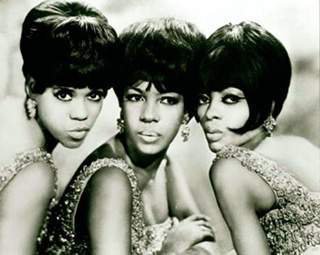
There are many things that stars of stage and screen these days seem very happy to talk about: their former or current addictions, the assault case, the booze-fuelled nights, that bitch/bastard of an ex, their fall from grace and so on. Then there is the taboo area: money.
About 15 minutes in to a wide-ranging conversation with a founding member of the Supremes, Mary Wilson -- who was the sole remaining original member when she folded the group in 1977 -- I bring up the subject.
It seems fair to ask how she survived in those years when she and her label Motown were into heavy counter-litigation in the mid-Seventies. I was curious -- as I have been about so many Sixties acts -- as to whether at the time she was still getting a decent royalty cheque from all those hits (Baby Love, Stop in the Name of Love, I Hear a Symphony, My World is Empty Without You and You Can’t Hurry Love in a two year period from 1964) which helped build Berry Gordy’s soul empire.
I get the question out to Mary -- who is at home with grandchildren, and a puppy gnawing on the phone cord -- and suddenly another voice is on the line, a woman who had obviously been listening to every word of our conversation.
“I’d prefer if we didn’t really talk about that,” says this mystery woman.
Jeez, I didn’t know “we” were talking about anything. I thought I was talking with Mary Wilson -- a sharp and witty 64-year old grandmother who has had a life as a star, best selling author, band manager, United Nations ambassador appointed by Colin Powell and much more. She seems perfectly capable of answering or avoiding the question by herself.
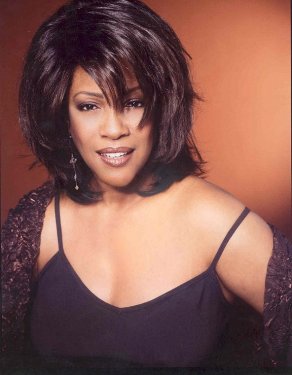 To her credit Mary carries on and I get an answer of sorts. It is polite, evasive but tells me what I suspected.
To her credit Mary carries on and I get an answer of sorts. It is polite, evasive but tells me what I suspected.
The small incident is emblematic of just what people consider off-limits these days. Drugs, guns, fucking in the streets is fine . . . . but ask about money and it’s almost like you want to know who they do behind closed doors. Although oddly enough they will talk about that.
Mary Wilson is funny, intelligent, reasonably open and utterly professional, as you might expect of someone who was schooled in the ways of etiquette as a teenager by the Motown machine.
“We taught them things,” Motown founder Berry Gordy told Mojo magazine recently. “We had people come in and teach them how to walk, talk, speak, eat, dance, do a lot of things in this assembly line, so that when they came out the other end they were hopefully a star.
“And that was the premise. It didn’t always happen, but it happened many, many times.”
It certainly happened to three members of a five-piece called the Primettes when Mary Wilson, Diana Ross and Florence Ballard were barely into their teens and became the Supremes.
Wilson, just off the plane from the 2009 Grammys where it seems 19-year old Chris Brown has hit the headlines for all the wrong reasons, recalls how well schooled Motown acts were in the ways of etiquette and public behaviour. Few Motown acts did a Chris Brown, Gordy just wouldn’t have it.
“I have to applaud Motown and Mr Gordy and the people there who recognised that was needed. It was Maxine Powell and one of the musicians in charge of the Motown Tour Reviews who came back and said to Mr Gordy that they needed to do something to train the kids because they were sounding good, but they were walking on stage looking kinda strange. So that is how that whole charm school came about.
“We needed to know how to carry ourselves, and that is something missing in today market strategies, you can’t just throw someone out there just because they are talented.”
There is no school that teaches you how to be famous, some young r’n’b or hip-hop artists have a hit and they mess up their lives.
Also we came from good homes. We were poor but our families in Detroit were concerned about us being better human beings. Our parents really taught us well. There were things professionally you needed to be taught obviously, but if you think about the old Hollywood artists, that is what they did for them. They trained them all so they came out polished.
I always imagined young artists from Motown would have been scrupulously polite anyway.
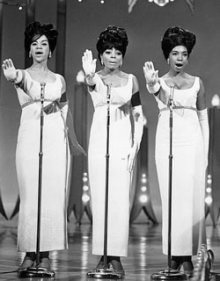 Yes, Mrs Powell was the charm school aspect of artist development, she always said we girls were like “diamonds in the rough and we are just here to polish you“.
Yes, Mrs Powell was the charm school aspect of artist development, she always said we girls were like “diamonds in the rough and we are just here to polish you“.
What a nice thing to say, you would remember she called you diamonds even if you didn’t get the bit about being in the rough.
Oh yes indeed. It is needed today and it’s something I have considered starting up for young artists.
Brian Epstein took the Beatles out of leather jackets and put them into suits because he believed this was going to get them into the mainstream. I wonder if Motown, being political at some level and aware of the social environment in the early Sixties, was thinking of that too, of making you more acceptable to a broader audience?
I don’t know if it was like that, but we as the Supremes were always lady-like and we came in wearing little pearls and the like and I think that Motown did notice that was what we were all about. And they helped to perpetuate that image. There was a certain style and class about us even though we were shopping at five and dime stores for our “pearls”. Motown saw that was the way to go, but we weren’t “packaged“. But it was a very supportive environment.
Do you remember a time when you three walked out that door and jumped and down and said “that’s it, that’s it!“ because Mr Gordy had said something to you, just a moment when you knew you were going to make it? Or was it a gradual build-up?
Our story was more of being turned down. We already were a little local group working around Detroit doing record hops. We did them with very famous artists and were the local support act. After doing a couple of those we thought we could record too. So we went there [Motown] and auditioned for Mr Gordy and he liked us but said, “Come back after you have graduated from high school”. Years later we found out he just didn’t want us girls running around the studio no matter how good we were!
So we decided that’s where we wanted to be and started hanging around and eventually one of the producers said the background singers weren’t there and we said. “we’ll do it” . . . and that was our entrée to Motown.
We stayed there and did not give up.
Do you remember taking your first Supremes record home and putting on the record player for the people at home?
Oh yes, our first record was I Want A Guy [sings, “I want a guy . . .”] and we played that to everybody in the projects. We were thrilled.
The Supremes’ story is a controversial and well-known one: how after years of no chart success they started nailing hit after hit (one about every four months in two remarkable years from 1964); how their huge fake eyelashes, elaborate gowns and bouffant hairstyles became an iconic look of the mid 60s; and how Gordy pushed Ross -- with whom he later had an affair and a daughter -- into taking lead vocals and in 67 started billing the group as “Diana Ross and the Supremes“.
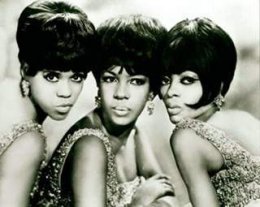 Then there were the dark days and rancour within the ranks; Ballard spiralled downwards through depression and alcoholism to be fired in 67 and die in poverty nine years later; Ross quit in 1970 to pursue a solo career and movie roles; and Wilson kept the Supremes going through a revolving door of other members . . .
Then there were the dark days and rancour within the ranks; Ballard spiralled downwards through depression and alcoholism to be fired in 67 and die in poverty nine years later; Ross quit in 1970 to pursue a solo career and movie roles; and Wilson kept the Supremes going through a revolving door of other members . . .
It was a decade that passed in a blur, from meeting the Beatles and topping the charts to a slow decline within five years. But Wilson, although the hits stopped coming, had an eye on the legacy they had created in that time which has supported her to this day.
I know you collected all the costumes but over the years did you collect all your singles and albums? A lot of musicians never get the time or even think about that because they are on the road or busy working.
I didn’t do that because we were always recording or on the road. Now I ask fans if they can help me collect, so over the past 15 or 20 years I have started collecting them. Of course everything now is CD and you try to buy an original album and it’s $400, if you can find one.
Those must have been thrilling days for young women on the road but you would have been very well chaperoned.
Oh yes, the Motown Review tours had everyone like Stevie Wonder, Marvin Gaye, the Miracles, the Contours . . . And all the girls had a chaperone, one or two ladies looking after the girls -- because you have all these musicians and male groups and we were all under 21. So we the Supremes had chaperones until we were about 25.
But at some point you don’t necessarily want that chaperoning, you want to be more free. Did you push against that?
We didn’t do too much of it, always there was a little bit of hanging out but we really were like goodie two-shoe girls and didn’t do a lot. Maybe later in life, but just what usually happens to young girls and guys, a lot of sneaking around going on.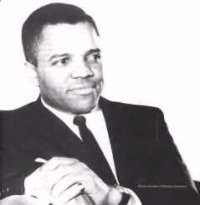
There was also the time in ‘72 when Berry Gordy [left] said Motown was going to LA. How did you feel about that? Many felt the label would loose touch with its roots.
Actually I and Cindy Birdsong [who replaced Ballard] moved to LA before Motown because we were doing a lot of TV shows -- Dean Martin, Sammy Davis and so on -- so we were always in Hollywood and had come so closely connected to it in 1968. So we’d made that transition.
At the time we were bi-coastal and I had home there and back in Detroit. There was something that everyone felt about leaving Detroit, but at the time Detroit had declined and there had been the riots. So the label wanted a lot better environment.
And a bigger audience through connection with movie industry?
That was more of Berry Gordy’s thinking. We moved away from Motown so we could have more freedom at that point, that was the late Sixties.
I know you felt aggrieved when you were pushed sideways out of being the lead singer, but by ‘73 it was very much your group again.
Yes, I took over the management because at that point the company had not closed down, but had moved in different direction and people were getting their own niches. I wanted to keep the group going and in order to do that I had to take over all the administrative type things, the gowns and whatever. And so it was my group at that point.
Can I ask you the blunt question, which is always about money. You were doing a lot of live work at that time and I know the albums were not being as good for you in terms of sales, but were you seeing much from the Sixties hits to keep you going?
[Unidentified voice: “I’d prefer if we didn’t really talk about that.”]
Here’s the way for me at that point: the royalties were already set and they are what they are, but we were pretty much on the road and basically that was the revenue.
You must have been quite personally hurt at that time about the litigation that went down between you and Motown, thinking “this is not right, I grew up with this company and I’ve been good to it“. Is that what you felt?
My litigation had to do with the fact that it was a time when everyone was leaving and my issue was getting the name “Supremes“. Not so much a company thing but what I felt I needed to do as an artist and where I might want to go in the future, because eventually I ended up going up on my own. If I had kept the group going that was something I needed to do to keep the record straight.
That leads us to the Truth in Music Bill which you have been an advocate for and I have to tell you every now and again I see “The Drifters” going through New Zealand.
I know, it is really something unfortunate. I and lots of others from the Fifties and Sixties got this grassroots movement going where we have now got legislation passed in about 30 different states which says that if you were not part of the original recording group then you cannot call yourself by that famous name.
Even now with the “Temptations” and “Supremes” there are four or five different groups out there using that name, that’s why I got this going and the fight is constant. The week of the Grammys there was a panel and I was one on it with Sam Moore [of Sam and Dave] and [songwriter] Lamont Dozier and four different congress people speaking about things we want to rectify in the business.
So these litigations go on and on, but I am happy that people are willing to talk about it and also take care of some on the injustices that have happened. And we have record companies coming in on it, and that’s a beautiful thing because there are artists who have given them so much of their talent.
On another level there are injustices where artists are dying without being compensated. That’s part of what of what I do, and performance rights. I’m the outspoken person bringing attention to all of it! The reason is people really want to help.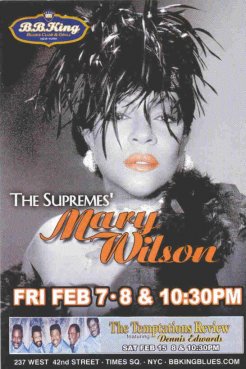
Your background gives you a degree of credibility in talking about these things.
And I certainly spend a lot of money on it! Tell me. how is Motown being taken there in New Zealand.
In New Zealand when I was growing up in the Sixties we had open format radio and so Motown music was played alongside everything else like the Beatles and the Rolling Stones. Everyone here knew the Supremes, Four Tops, Temptations and so on. Motown was huge. Your photo is on big posters here right now.
I need to come over there and work then!
In some ways the Supremes story is a sometimes tragic one, but the details and ironies have been replaced in the public imagination by the recent movie Dreamgirls about a similar but fictional group, and a similar record industry figure to Berry Gordy.
Smokey Robinson said the filmmakers should apologise to Gordy and Motown because he read it as a very literal Motown story and felt that Mr Gordy ands the label had been misrepresented. At times you seemed quite ambivalent about it, however I have also seen some further comments where you have said quite bluntly it wasn’t your story.
It’s a very hard thing to be open and honest about because on one hand it is a great work of art, on the other it is almost like if someone lifts your written work, plagiarism.
You have a piece of work that could be about this entity but people take the liberty of adding certain things and taking certain things out and say, “it’s not really about them”.
But you look at it and see that it is similar.
So I can’t say I don’t like it, I would never say that because it is a beautiful piece of work. But it’s not the story of the Supremes even though the mass amount of people think it is. But it has drawn attention the Supremes and even helped record sales.
But it was not the story of the Supremes or Motown, it is set in that time frame using images that are similar. So it is difficult to answer that correctly.
The truth is much more interesting than the fiction anyway as your best-selling autobiography [Dreamgirl: My Life as a Supreme in 1986] showed.
It is, so much more so. But [the film makers] have to do it their way otherwise they have to end up paying everyone! So, it’s about you but not about you?
I am very happy that Motown and Smokey stood up and cleared that up. There were a lot of things that were taken from Supremes. So it’s very difficult.
You must have looked at it and thought, “that’s my hair up there on screen“.
Oh yeah, and the eyelashes!
You are still on the road these days, singing Supremes songs?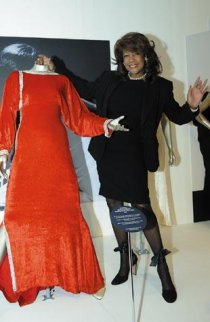 I have different things I do. I do lectures, symphonies, I do my rock’n’roll show which is the Supremes, and I have a jazz show. I have my touring gown collection and it has a lot of Motown memorabilia and video footage too of Martin Luther King and tells the whole story of that time through music and our gowns.
I have different things I do. I do lectures, symphonies, I do my rock’n’roll show which is the Supremes, and I have a jazz show. I have my touring gown collection and it has a lot of Motown memorabilia and video footage too of Martin Luther King and tells the whole story of that time through music and our gowns.
That’s my way of commemorating the Supremes in this 50th anniversary. It has been in the Victoria and Albert Museum in London last year, and went to Birmingham and Blackpool.
Let me ask you about your charitable work, you are the spokesperson for the clearance of landmines.
I was a cultural ambassador for the US appointed by Colin Powell and went to many countries in Africa and spoke on Aids awareness and went to all kinds of school. I’ve been to Pakistan, Sri Lanka and all over with the American State Department.
When [president George] Bush came in that whole thing closed down and the people I had worked with knew about this other NGO that needed a spokesperson after Princess Diana died, so they recommended me because they had seen the work I had done.
I just loved the idea of putting my name and energies into it. We do as much as we can.
That is one thing Motown has given me and many of my contemporaries from Motown, we have a lifelong career and it helps us do many things other than sing or perform.

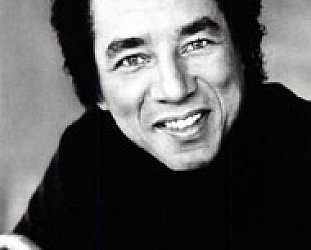
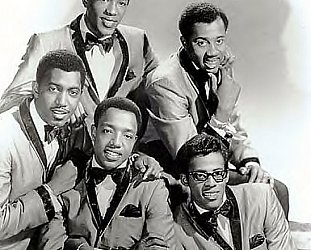
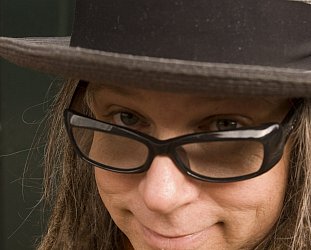

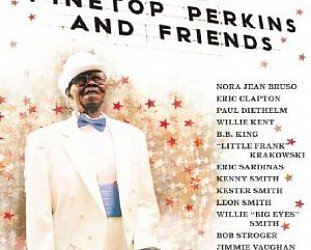

Carl Jenkins - Mar 18, 2009
Mary Wilson has ALWAYS been a fascinatingly influential individual, and it continues to shine here! She has been an integral part of MY life personally and professionally as well! It is great to read these things that portray the scope of influence of world matters that venture beyond 'just' the music part of the business.....altho' we know that the 'MUSIC' WAS and IS the 'door' that opened up ALL of the possibilities and the discoveries of other abilities once allowed to explore and test 'waters', which is something Ms WILSON has ALWAYS DONE and been a part of establishing in the world as we know it to date! I am very proud to read these things, not in a sense of ego, but in the sense of 'accomplishment' that she is continuing to represent not only for herself, but for ME and for 'us' as 'PEOPLE'! THAT is SUPREME far beyond the hit records, and the fames that many have achieved, and rightfully belong to HER as WELL!
SaveThough, a bit 'miffed' by that 'mystery voice', I am still impressed by the diplomacy that Ma Wilson 'IS', not just merely displays or knows how to turn on to facade. So much Integrity is imbred in this individual by way of experience and life lived, I am still able to believe somehow in mankind, because SHE exists! And to her, and to you, the interviewer, I sing....."Here's To Life"! With Much Love!
Bear - Dec 10, 2010
This Woman has the most selective memory in History, She made a career bashing Berry Gordy, Diana Ross, Motown & just about anyone else she could slander in that Dreamgirl book.
SaveNow she plays all sweet & Diplomatic?
Just what is the motivation, Perhaps the reality of refusing 4 million Dollars to sing baby, baby @ 30 shows has hit that stunned bitch?
She is broke, with little talent and few options. Now 'Dian" is such a good friend & sister again!
She wants to get back what she so foolishly walked away from.
The things she seems to Refuse to talk about, have alot to do with Money, she made about a Million Dollars from her "Dreamgirl book (God only knows how much of that she snorted up her nose).
She still recieves about $85,000.00 per year off "Supremes Recordings, 9The same amount as Diana), Many of which "She Never Sang On", Like The 2 Biggest Supremes Hits Ever, 1) Love Child, 2) Someday We'll be Together.
How relavant is she really, Diana Ross produced most of The Supremes output from 1967- 1970 Without the Supremes
LARRY JOHNSON - Oct 28, 2012
THE MOST MAGNIFICENT OF ALL GIRL GROUPS OF ALL TIME. DIANA LED THE WAY.
Savepost a comment